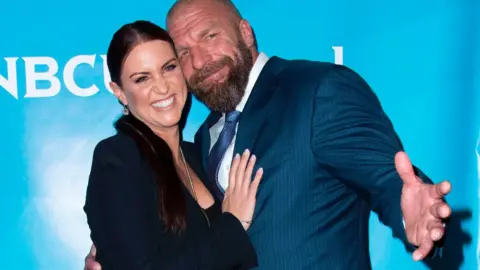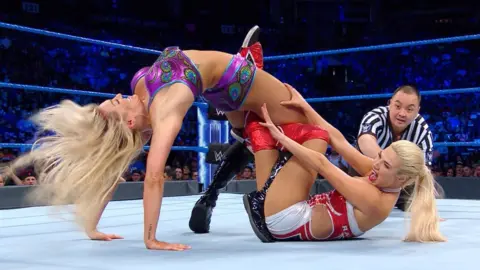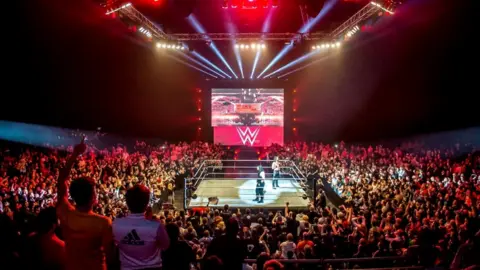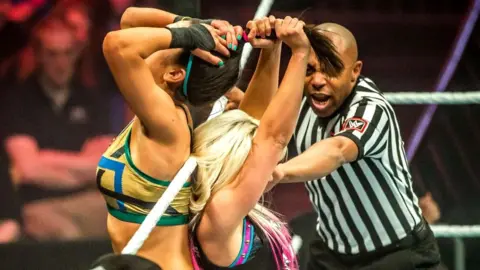CES 2018: How social media has reshaped WWE wrestling

Stephanie McMahon is a more hands-on executive than most. As well as being World Wrestling Entertainment's (WWE) chief brand officer, she has been a regular fixture inside the ring since her on-screen debut in 1999.
As a wrestler, she held the Women's Championship belt and was part of some of the franchise's most successful storylines. More recently, she has played a no-nonsense commissioner calling the shots, along with husband Triple H.
It's not a role that requires too much acting, however. Ms McMahon did indeed marry Triple H, real name Paul Leveseque, in 2003.
And while thankfully less fearsome in real life, she has been the driving force calling the shots behind a push for fairer treatment for women in the ring.
Her appointment as chief brand officer came with a brief to help shape the WWE so that it attracts more female viewers.
I met Ms McMahon at CES, where she was busy promoting the WWE's move into virtual reality and a tie-up with Facebook Watch, the social network's on-demand video service.
 Getty Images
Getty ImagesMs McMahon said the experimental deal with NextVR will see the company produce six virtual reality experiences over the next year, putting viewers face-to-face with WWE Superstars, and letting them "feel what it [is] like for 10,000 people to be cheering for you, or booing you".
"Or what it's like to climb into the ring and be standing face-to-face with the Big Show, who's 7ft 5in [2.3m] tall," she added
If it's a success, more will be made, the company said.
It's the WWE's latest attempt to remain relevant with viewers in the face of massive competition from new competition, like the Ultimate Fighting Championship (UFC), and the vast array of wrestling content now on YouTube and similar sites.
The VR content will be accessible through NextVR's app, while the Facebook Watch show - Mixed Match Challenge - begins later this month.
Monday night milestone
The WWE is no stranger to re-inventing, or at least evolving, its product. The ring itself may not have changed but just about everything around it has.
The company's resilience is most apparent with Monday Night Raw, its flagship weekly show, which this month celebrates its 25th Anniversary. The milestone makes it the longest-running episodic weekly show on US television - not taking a break since 1993.
Faltering viewing figures and a scandal over steroid abuse eventually brought about a rebrand and the "Attitude" era, a less family-friendly product that spawned big personalities, with The Rock becoming the company's biggest household name since Hulk Hogan. WWE was pulling in the big ratings once again.
But that came, perhaps, at the expense of women's dignity in the ring.
From 1990, female competitors in the WWE were known as Divas, and while the men competed in matches designed to show their brawn, women were instead often involved in arguably degrading spectacles.
 WWE
WWEOne popular match type, known as "Bra and Panties" involved competitors attempting to strip their opponent - the loser being the first to get down to just their underwear.
Ms McMahon believes that era is now over - and it was pressure from fans airing their frustrations online that forced the change.
"What has started in WWE is actually called the 'women's evolution', and it started because of a hashtag," she explains.
That hashtag, #GiveDivasAChance, began after a women's match lasted just 30 seconds. It was a tipping point.
"Our fans were calling for more enhanced storylines, better character development, more athleticism in matches," Ms McMahon recalls.
The script writers got to work and a new storyline saw Divas renamed, straightforwardly enough, as the Women's Division.
 AFP
AFP"Our women are now going to be called Superstars, same as the men."
The culmination of those efforts was a historic contest. In December, WWE hosted the first ever women's wrestling match in the United Arab Emirates. While the attire was more conservative, such an event would have been illegal just one year earlier.
"A chant rang out in the arena that said 'this is hope'," Ms McMahon remembers.
"I just couldn't be more proud. As a mom of three little girls, I think it's important and necessary," says Ms McMahon.
Changing a culture
But a hashtag and rebrand won't be enough to change a culture overnight.
While the WWE hasn't found itself at the centre of any major sexual harassment claims in the way Hollywood has, some female wrestlers did share stories as part of the #MeToo movement on social media.
Criticism has been levelled at the likes of Jerry Lawler, a former wrestler-turned-commentator who popularised the use of the word "puppies" to describe women's breasts on air.
Asked about the issue of sexual harassment, Mr Lawler - known as "The King" during his wrestling days - drew ire for comments made on a podcast.
 AFP
AFP"It appears that eventually anybody that's ever flirted with anybody, or had any kind of sexual contact with anybody, is all of a sudden you could potentially be a target in the future," he said.
"That's the way the country has become.
"Everything 99% of the people may think is done in jest, or whatever, and all of a sudden that 1% out there is gonna be offended by it."
But slowly, the cogs are turning. This year the WWE will, for the first time, host a women's Royal Rumble - the classic, thrilling free-for-all match where competitors are eliminated when thrown out of the ring.
Early encouraging indications are that the efforts to reach a more diverse audience, both on TV and online, are paying off. Some 40% of all WWE viewers are now women, Ms McMahon says.
And that hasn't meant taking a timid, less sexy approach: WWE's women still wear unfathomably skimpy, revealing outfits. But then, of course, so do the men.

Follow Dave Lee on Twitter @DaveLeeBBC
You can reach Dave securely through encrypted messaging app Signal on: +1 (628) 400-7370
